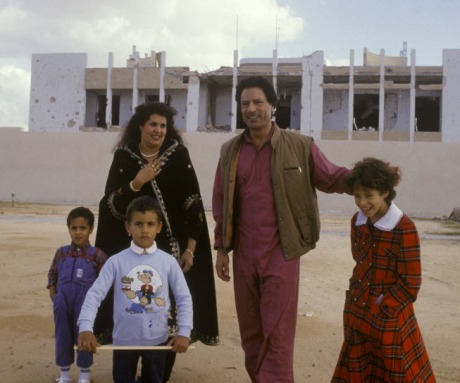 Here, Qaddafi poses with his second wife, Safia, and some of his children in November 1986 near the Bab Aziza palace in Libya, destroyed in a U.S. air raid. Qaddafi has eight biological children, seven of them sons, many of them embracing, in one way or another, the Western values that their father hated (and has railed against). But with his regime under fire, the Qaddafi children have been among their father’s most ardent supporters, in many ways rejecting their past inclinations toward reform and partnership with the West.
Here, Qaddafi poses with his second wife, Safia, and some of his children in November 1986 near the Bab Aziza palace in Libya, destroyed in a U.S. air raid. Qaddafi has eight biological children, seven of them sons, many of them embracing, in one way or another, the Western values that their father hated (and has railed against). But with his regime under fire, the Qaddafi children have been among their father’s most ardent supporters, in many ways rejecting their past inclinations toward reform and partnership with the West.
Tag: Libya
Chart of Who Buys Oil From Libya
Gadhafi is Looney Tunes
The Straw that Broke the Camel’s Back of Dictatorships
Mohamed Bouazizi was 10 years old when he became the main provider for his family, selling fresh produce in the local market. He stayed in high school long enough to sit his baccalaureate exam, but did not graduate. (He never attended university, contrary to what many news organisations have reported).
Bouazizi’s father died when he was three years old. His elder brother lives away from the family, in Sfax. Though his mother remarried, her second husband suffers from poor health and is unable to find regular work.
“He didn’t expect to study, because we didn’t have the money,” his mother said.
At age of 19, Mohamed halted his studies in order to work fulltime, to help offer his five younger siblings the chance to stay in school.
“My sister was the one in university and he would pay for her,” Samya Bouazizi, one of his sisters, said. “And I am still a student and he would spend money on me.”
He applied to join the army, but was refused, as were other successive job applications. With his family dependant on him, there were few options other than to continue going to market.
By all accounts, Bouazizi, just 26 when he died earlier this month, was honest and hardworking. Every day, he would take his wooden cart to the supermarket and load it would fruit and vegetables. Then he would walk it more than two kilometres to the local souk.
Police abuse
And nearly everyday, he was bullied by local police officers.
“Since he was a child, they were mistreating him. He was used to it,” Hajlaoui Jaafer, a close friend of Bouazizi, said. “I saw him humiliated.” Continue reading “The Straw that Broke the Camel’s Back of Dictatorships”

